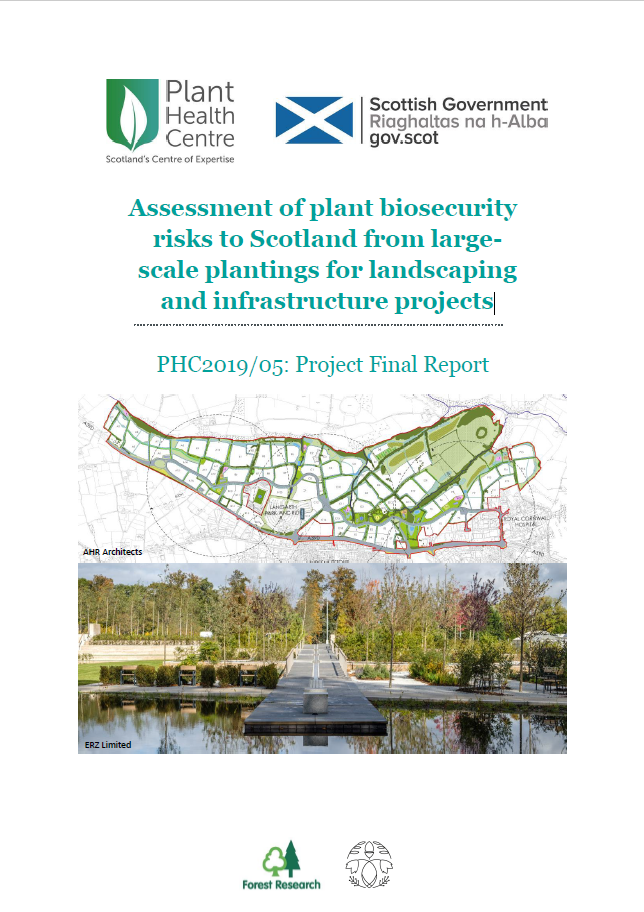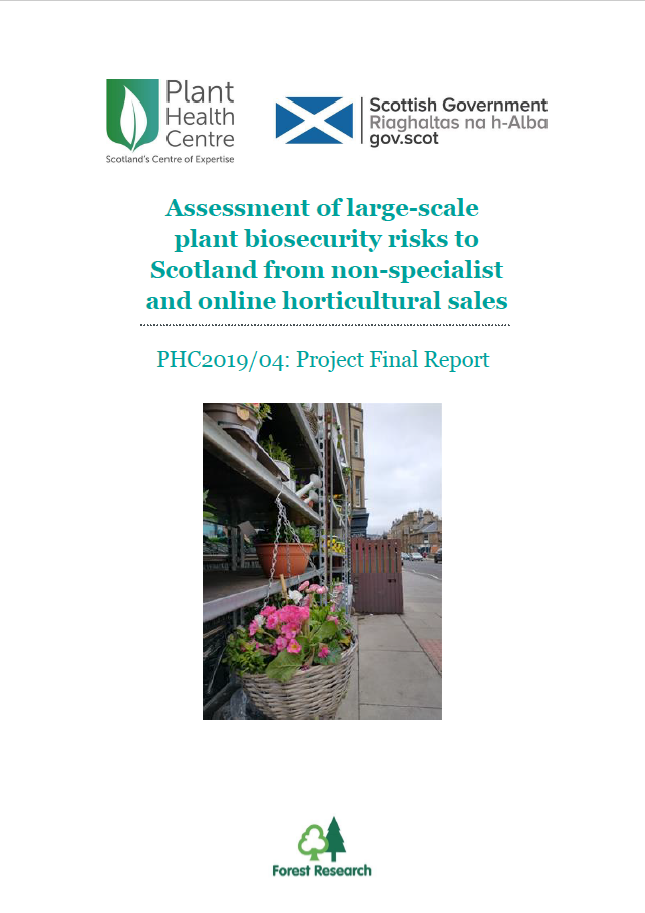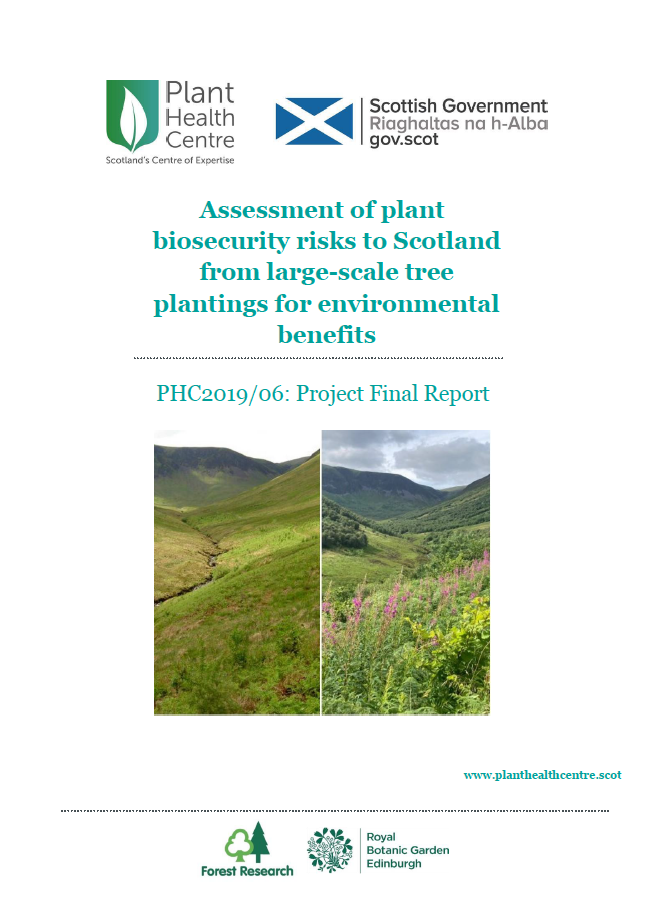Summary
This research aimed to better understand potential large-scale threats to plant biosecurity in Scotland. Specifically, we explored the risks posed by i) non-specialist and online horticultural sales, ii) planting for landscaping and infrastructure projects, and iii) planting for environmental benefits. In each case we engaged with a selection of key stakeholders to identify the major biosecurity strengths and weaknesses in different sectors and highlighted opportunities for improved future practice.
Descriptions of the three projects can be found on Scotland’s Plant Health Centre website. The final reports will be available at the end of May 2021
Large-scale planting for landscaping and infrastructure projects
Findings and Recommendations
- This project focussed on a tracing exercise of 13 existing large-scale landscaping and infrastructure projects in Scotland. We spoke to different stakeholders each involved in at least one stage of planning, specification, procurement, monitoring and planting. This helped us get a holistic view of these projects from start (when they produce the planting plans) to finish (when the plants have been planted and are maintained). In total, we spoke to 18 respondents including landscape architects, clients, landscape contractors, landscape managers and local authority council planning departments. In addition, a number of sites were visited to check what had actually been planted.
- We found that 67% of participants believed that the planting carried out matched the original plans. However, fieldwork showed that just a quarter of these sites were planted exactly as specified on the plans. This shows that there is a mismatch in perceptions of and actual practices.
- There was generally low awareness of biosecurity among the participating stakeholders, with just 15% reporting their awareness as high. None of the stakeholders reported biosecurity as one of their most important factors when specifying plants, choosing a contractor, or choosing a plant supplier.
- Interview respondents felt a sense of pride towards their projects and expressed an interest in learning about biosecurity. However, our findings show that responsibilities for biosecurity are not clear and there is often an assumption that others are taking care of plant health. There are a number of systemic biosecurity issues throughout the process from specifying plants (e.g. lack of species diversity) to planting (e.g. not all plants specified ended up in the ground). This poses a potential risk to Scotland’s plant health.
- We also identified a number of opportunities, for example, including more stringent biosecurity measures when specifying plants, improving communication, oversight and enforcement throughout the process, and improving awareness among stakeholders. The research participants were very engaged and interested in the research, indicating scope for further engagement with these groups.
Large-scale tree planting for environmental benefits
Findings and Recommendations
- This study features five case studies on the potential biosecurity risks from large-scale tree planting schemes which aim to deliver environmental benefits within Scotland. We conducted 18 interviews with key players involved at different stages of the project and reviewed key documents.
- Existing pests and diseases within the region were of greatest concern, while emerging threats present in other parts of the country or overseas (such as emerald ash borer, Xylella fastidiosa or acute oak decline) were infrequently mentioned.
- Despite awareness and experience with a number of pests and diseases, there is a feeling that some – particularly those dispersing by wind – are difficult if not impossible to prevent. Lack of awareness about how best to manage for some threats (due to the complexities of applying guidance to real word situations) may contribute to an acceptance of risk.
- Managers regularly attempted use of local provenances and locally collected seed, and to specify plants suited to the site conditions. This is thought to reduce the risk of introducing pests and diseases to the site, and to ensure optimal health of the trees and thereby their resilience to pests and diseases. However, sometimes supply issues may necessitate use of stock from further afield or of different provenances.
- Complications may arise due to the large volumes of trees needed for these projects, and the number of actors involved. This may include prolonged periods of storage which can act as a quarantining period but can also pose health risks to the trees through stress, infection or cross-contamination.
- It was recognised that good biosecurity practices are needed to prevent introduction and spread of pests and diseases on clothes, vehicles and equipment. However, this can be difficult to enforce in large-scale planting projects across open-access areas with multiple actors.
- Delivery of planting stock on site was recognised as a potential pest and disease pathway. Often more than one nursery is required to source the specified stock, which makes the supply chain more complicated with more potential pathways for pest and disease introductions. Ultimately, managers of such schemes rely on trusted nurseries to supply biosecure stock.
Non-specialist and online horticultural sales
Findings and Recommendations
- For this project we contacted retailers selling plants online as well as non-specialist retailers of plants (those retailers where plants are not their main product type). This included supermarkets, DIY stores and lifestyle stores. We were able to interview four large non-specialist retail chains but also collected 100 survey responses from online plant retailers. All interviews and survey respondents were from businesses based or operating in Scotland
- Biosecurity is often stated as a low priority for many online businesses. However, long-lasting relationships are often formed between retailers and suppliers that include internal biosecurity discussions and audits. More than 70% of survey respondents sought information on pests and diseases and checked plants on arrival (although 20% didn’t). However, fewer than 50% had a biosecurity policy.
- Knowledge and concern around pests and diseases are largely related to those already present in the UK, such as ash dieback and Phytophthora ramorum. There appeared to be less concern about potential threats not yet present in the region or country, such as Xylella fastidiosa. Actual incidences of pests and diseases were very low.
- Online retailers can have minimal contact with both the product (plants) and the customer, which has implications for awareness and responsibility for biosecurity. Within large businesses, knowledge and responsibility for biosecurity is potentially distributed across several roles, which amplifies the difficulties of targeting dialogue around risk.
- It is difficult to distinguish between the concept of high quality and biosecurity (i.e. pest and disease free). Most survey respondents were more comfortable discussing quality (the most frequently high-ranked characteristic in a supplier was ‘quality stock’) and there is a potential for using this concept to drive biosecurity messaging.
- Over 70% of online retailers were either participating in, or willing to participate in the Plant Healthy scheme which aims to ensure a high biosecurity standard among suppliers. The most commonly reported barriers to taking increased biosecurity actions were being unsure of what actions to take and wanting to see other businesses adopt similar practices first.

Research Objectives
- Identify key decision-makers for biosecurity activities and, through dialogue, gauge their level of awareness of pest and pathogen threats, together with their roles, level of responsibility and the scale (local, regional, national and global) of their operation.
- Identify from these key decision-makers the primary factors that influence decision-making relevant for biosecurity (including procurement and other business decisions) and the degree to which biosecurity is already considered or could feature more strongly in future.
- Summarise the major strengths and weaknesses of current biosecurity practices.
- Assess the barriers to more stringent biosecurity.
- Summarise opportunities for enhancing biosecurity including roles for awareness raising, incentives and regulation.
Findings and Recommendations
The below links will take you to our pages outlining research findings for each of the three topics
- Non-specialist and online horticultural sales
- Large-scale planting for landscaping and infrastructure project
- Large-scale tree planting for environmental benefits
A policy summary can be found on the Scottish Plant Health Centre’s website, and the reports for each project are listed below.

Our Involvement
Forest Research led the research with support from Royal Botanic Gardens Edinburgh, University of St. Andrews, St. Andrews Botanic Garden, James Hutton Institute, Fera, the UK Centre for Ecology and Hydrology and Scotland’s Rural College.
Downloads

phc2019_05_final_report_biosecurity_risk_landscaping_infrastructure
B. Karlsdóttir, C. Pollard, A. Paterson, H. Watkins, M. Marzano (2021). Assessment of plant biosecurity risks to Scotland from large scale plantings for landscaping and infrastructure projects: Project Final Report. PHC

phc2019_04_final_report_biosecurity_risk_online_nonspecialist
Pollard, C.R.J., Marzano, M., Paterson, A. (2021). Assessment of large-scale plant biosecurity risks to Scotland from non-specialist and online horticultural sales: Project Final Report. PHC

phc2019_06_final_report_biosecurity_risk_tree_plantings
Dunn, M., Finger, A., Marzano, M. (2021). Assessment Of Plant Biosecurity Risks To Scotland From Large-Scale Tree Plantings For Environmental Benefits: Project Final Report. PHC
Funding & Partners
- The research is funded by the Scottish Plant Health Centre, which is in turn funded by Scottish Government through RESAS (Rural and Environment Science and Analytical Services Division) to help tackle plant health challenges for Scotland.
